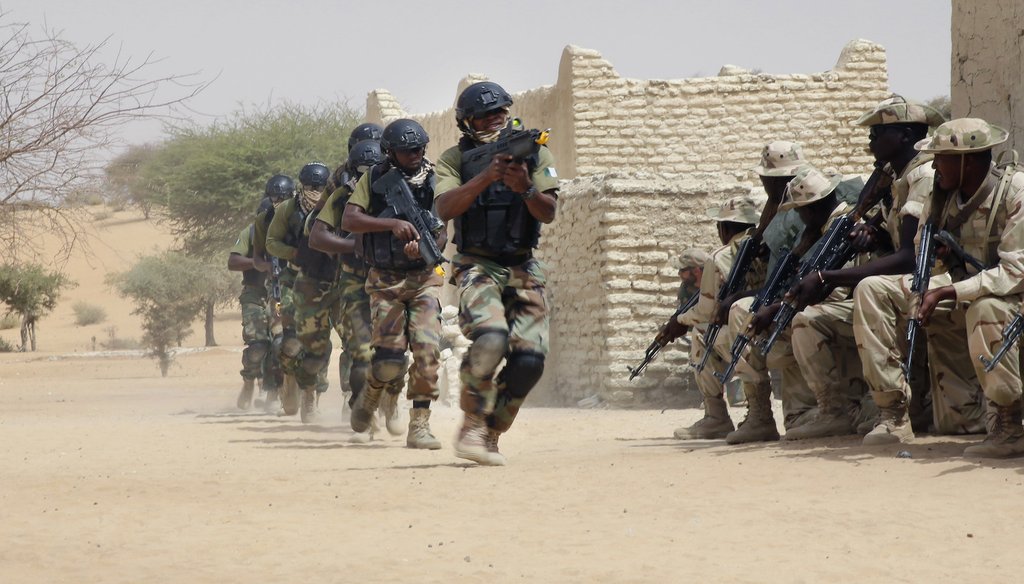Stand up for the facts!
Our only agenda is to publish the truth so you can be an informed participant in democracy.
We need your help.
I would like to contribute

March 7, 2015, Nigerian special forces and Chadian troops participate with US advisors in the Flintlock exercise in Mao, Chad. (AP Images)
If Your Time is short
-
The United States still has troops stationed in Iraq and in many other places, some of whom are involved in combat with enemy militants.
-
The broad legal infrastructure that dramatically broadened the scope of U.S. counterterrorism operations after 9/11 is still in place.
-
U.S. forces are still involved in a sprawling global counterterrorism campaign involving air strikes, drone strikes, and the use of special operations forces.
During a speech at the United Nations on Sept. 21, President Joe Biden referenced the end of the Afghanistan War, claiming that the United States had finally returned to a peace footing after 20-years of armed conflict.
"I stand here today, for the first time in 20 years, with the United States not at war," he said. "We’ve turned the page."
The reality is more complicated than that. The withdrawal of the last U.S. troops from Afghanistan on Aug. 30 brought an end to the longest war in American history. But the end of the Afghanistan War is not the same thing as the end of what George W. Bush called "the global war on terror." According to foreign policy experts, the broad legal and military infrastructure developed in the aftermath of the Sept. 11, 2001 terror attacks remains in place and is still being used to send U.S. forces into combat in other locations.
So while it’s technically true that the U.S. is no longer in a sustained armed conflict with another state, it’s worth noting that American forces are still in the position to deploy deadly force on foreign soil, often in the form of air strikes and discreet special operations kept secret from American civilians.
In the years following the Sept. 11 terror attacks, the U.S. government implemented a series of resolutions and legal authorities that dramatically expanded the president’s ability to conduct counterterrorism operations. What has resulted from this legal framework is a sprawling campaign involving raids by special operations forces, drone strikes, air strikes, and other actions that don’t commonly make headlines.
Sign up for PolitiFact texts
In 2001, Congress passed an authorization for the use of military force allowing the president to wage war against those responsible for 9/11. However, in the years that followed, this resolution has been used to justify strikes everywhere from Eritrea to the Philippines, including against people who played no role in planning or executing the attacks.
Along similar lines, an obscure legal authority originally passed as part of the 2005 National Defense Authorization Act allowed the U.S. to send special operations teams into combat alongside foreign allies in raids against armed militants. Many of these programs — known as "127 echoes" — are kept secret from the public; however, investigative reporting has suggested that they have taken place across the Middle East and East Africa, in countries that include Kenya, Somalia, Mali and Niger, in effect constituting what Politico has called "a secret war."
Stephanie Savell, a researcher at Brown University’s Costs of War Project, developed a map showing the scope of U.S. counterterrorism operations between 2018 and 2020, finding that it stretched into 85 countries. According to the Bureau of Investigative Journalism, deaths due to U.S. drone strikes and other covert missions from 2010 to 2020 fall between 8,858 to 16,901 people.
"I believe aerial strikes and commando raids ought to qualify as ‘war’ when they are conducted routinely, with great intensity or over a significant duration of time, for the purpose of defeating or degrading an armed group," said Stephen Wertheim, a senior fellow at the Carnegie Endowment for International Peace. "Such campaigns meet the typical definition of war as intense and sustained armed conflict."
The Biden administration has recently expressed interest in dialing back drone strikes outside of warzones and tightening the 2001 authorization to use military force. However, in a letter Biden sent to the leaders of the House and Senate, he acknowledged that the U.S. continues to deploy "forces to conduct counterterrorism operations and to advise, assist, and accompany security forces of select foreign partners on counterterrorism operations," noting that these forces may be required to defend themselves against threats and attacks. The countries named in the letter as places of ongoing counterterror operations include Iraq, East Africa, Syria, the Arabian Peninsula, Jordan, Lebanon and Turkey.
"If anything, the Biden administration seems to be doubling down on … forms of undeclared warfare — what Biden calls ‘over the horizon’ activities," Savell told PolitiFact, noting that there has been a lack of transparency around the use of special operations forces during his presidency.
In addition, said Wertheim, Biden’s U.N. speech didn’t reference the fact that there are still roughly 2,500 U.S. ground troops in Iraq and roughly 900 U.S. ground troops in northeastern Syria, each engaged in multiyear efforts.
"U.S. military personnel have recently been attacked there, and the United States has recently conducted strikes in retaliation," he said.
Finally, Biden hasn’t shied away from using the legal infrastructure erected during the War on Terror from justifying new attacks on militant groups. In July, the administration attempted to defend a series of airstrikes against the extremist group al-Shabab in Somalia with the 2001 authorization to use military force, drawing fire from top Democrats.
While the withdrawal from Afghanistan is certainly significant in political, military and financial terms, the expansion of the U.S.’s ability to take violent action abroad has not disappeared, and the special forces and intelligence community abroad continue to operate in many places, said Joseph DeThomas, a professor at the Penn State School of International Affairs and former U.S. ambassador.
"The war on terror is over rhetorically and on the grand scale of geopolitics, but it is still going strong at the more tactical level," he said. "What is not clear to me is whether this more tactical capability will shrink and begin to wither away now that the big political and military commitments have ended or whether they will continue."
Our Sources
Interview with Stephanie Savell, senior research associate at the Costs of War Project at Brown University, Sept. 22, 2021
Interview with Joseph DeThomas, a professor at the Penn State School of International Affairs, Sept. 22, 2021
Interview with Stephen Wertheim, a senior fellow at the Carnegie Endowment for International Peace, Sept. 22, 2021
New York Times, End the imperial presidency, Aug. 25, 2021
New York Times, Biden secretly limits counterterrorism drone strikes away from war zones, Mar. 3, 2021
New York Times, Biden officials open to tightening law authorizing war on terrorist groups, Aug. 3, 2021
New York Times, U.S. troops are still deploying to Iraq, even as Afghan War ends, Sept. 20, 2021
Washington Post, As U.S. completes Afghan withdrawal, American allies in Syria watch warily, Aug. 31, 2021
Washington Post, U.S. targets Iran-backed militias in Iraq, Syria strikes, Jun. 28, 2021
The Intercept, Will the Biden administration shine light on shadowy secret ops programs? Mar. 20, 2021
Insider, Congress may repeal the post-9/11 act the US military used to justify the fight against ISIS, Jun. 29, 2017
Politico, Behind the secret U.S. war in Africa, Jul. 2, 2018
Politico, ‘A very dangerous precedent’: Democrats take aim at Biden’s Somalia airstrikes, Jul. 27, 2021
The Intercept, More U.S. commandos are fighting invisible wars in the Middle East, Sep. 25, 2019
The Bureau of Investigative Journalism, Drone Warfare
Costs of War, Afghanistan’s rising civilian death toll due to airstrikes, 2017-2020, Dec. 7, 2020
Costs of War, US Counterterror war locations

























